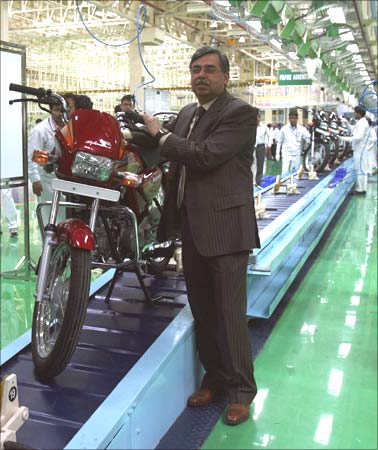
Pawan Munjal, the managing director and CEO of Hero Honda, has in his crosshairs a new two-wheeler which combines the performance of a bike with the price of a moped.
Right now a Hero Honda bike can be bought for around Rs 31,000. Shaving a couple of thousand rupees off the price tag will not make the market explode, Munjal knows. The sweet spot lies well below Rs 25,000.
His engineers are thus working towards a whole new price through value-engineering and some smart tax-planning.
Public sector firm Steel Authority of India Ltd is pushing its steel aggressively in the country's rural markets. Moving the produce to these markets costs a lot of money and is therefore priced higher than in neighbouring towns and cities.
So, the company has decided to give a subsidy of Rs 900 on every tonne of steel sold there. It hopes to sell 600,000 tonnes in rural markets this year. The annual subsidy will thus add up to Rs 54 crore (Rs 540 million) -- a small cost to gain the first-mover advantage.
Text: Bhupesh Bhandari
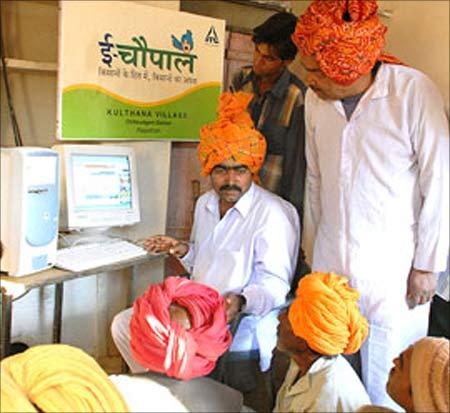
Now take a look at what ITC is doing. The company connects with five million farmers in 170 districts of 16 states. It buys farm commodities like tobacco, wheat, soyabean, mango and potato from them.
It also sells them some services through its e-choupal network and products through its network of rural retail stores. For every Rs 100 it pays to a farmer, it is able to get only Rs 20 back by selling him these products and services.
In other words, a huge upside is ready to be tapped. ITC has begun to work silently on selling extension services (advice on how to improve yield, etc) to farmers. These are services that can improve the income of the farmer which, in turn, will help him buy more from the marketplace. A chunk of this expenditure could be tapped by ITC.
The slowdown has driven home an important lesson to Indian businessmen and companies. The pot of gold indeed lies at the bottom of the value pyramid.
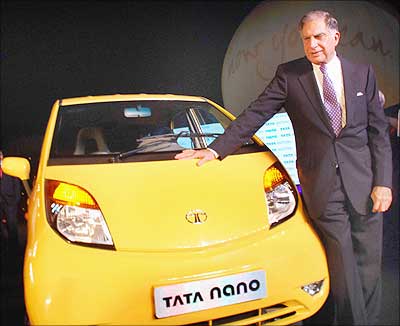
Products and services targeted at socio-economic categories A and B may sell well during a boom; but for all-weather sales you must have products that sell in large numbers in small towns and villages.
The way to go was shown by Ratan Tata and his small car, the Nano. The economic slowdown in urban markets has only reinforced it.
The task, mind you, is not easy. Indians might be good with frugal engineering but it does have its limits. Maruti Suzuki, for instance, debated internally for long if a cheap car could be built to take on Tata Motors' Nano. It was settled only when Suzuki, its Japanese parent, emphatically said it could not be done.
At this moment, the need is to understand the behaviour of consumers in small towns and villages.
What appeals to him, what intimidates him? To their utter surprise, a growing number of companies have found that it is a tough market out there.
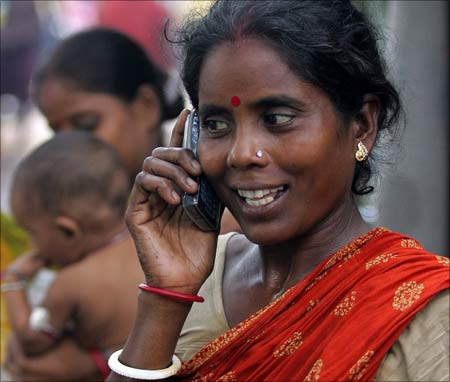
The brand consciousness, for instance, of a small-town customer may not be as evolved as his counterpart in the metros, but he is loyal to the brands that he currently consumes.
This is a huge obstacle private life-insurers face when they go out to sell their policies in small towns -- it is not easy to break customers away from state-owned Life Insurance Corporation.
What also seems to have emerged is that existing products, stripped of their features, are unlikely to work with customers in smaller markets. They are too evolved to be happy with something that is second-best.
That is why a Nano might sell and a stripped-down Maruti 800 may not.
They have strong aspirations which have been fuelled by strong growth in the vernacular media, though their purchasing power is less. They are also more engaged customers, probably because they have more time to go through the product experience.
They are also willing to trade on the Internet and jump technologies. They have, for example, started buying mobile phones and direct-to-home television instead of buying landline phones and cable television first.
What all this means is that consumers in such markets cannot be taken for granted.
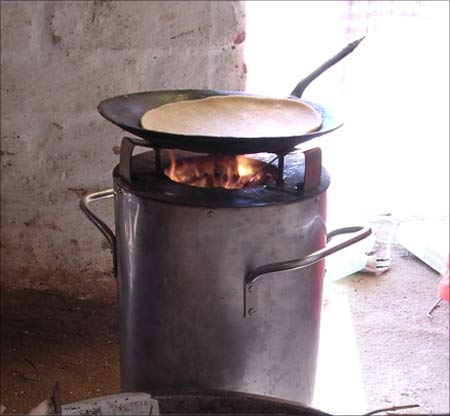
Philips has come out with stoves aimed at the rural markets -- the first initiative of its kind. It has all the blessings of the Philips brass at Eindhoven in the Netherlands. Yet, the India team is still not sure if it will become a killer product.
That's why it is putting the stove through a three-month pilot in the Guntur district of Andhra Pradesh.
The good news is that new products developed for small-town India can find a market abroad too, even in developed countries.
For example, General Electric has developed a portable low-cost electro-cardiogram in India. Though meant for use under rough conditions in India, the machine has started selling in large numbers in the US. General Electric, by the way, has put up a small power plant in Punjab that runs on cowdung. That clearly tells you where the future lies.